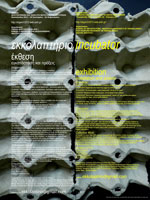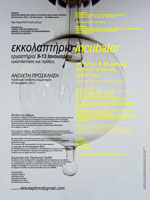Athanasakeion Archaeological Museum of Volos, February 11th to March 12th 2012.
This exhibition presents the works of children that participated in an arts workshop, “A travelogue through the Worlds of Art and History”, organized by artist Christina Nakou, during 2010-2011. In these after-class workshops, organized by the Hill School, Athens, 25 children, 5 to 10 years old, were creatively engaged in a dialogue between art and artistic practices of different historical periods and their own artistic art-making endeavours.
The exhibition is the creative outcome of a collaboration betweenthe Athanasakeion Archaeological Museum of Volos and the University of Thessaly (Museum Research and Education Laboratory, Department of Pre-school Education, and the Lab of Environmental Communication and Audiovisual Documentation (LECAD),Department of Architecture)
Events
-
Workshops
- Two workshops for children (5 to 10 years old) (12/2 & 10/3)
- A workshop for teachers and student teachers (10/3/2012)
-
Symposium(9/3/2012)
- Traveling In Time Through Art: Creativity in/as education
Seminar, Benaki Museum, 138 Pireos St, Friday 03/02/12, 17:30, amphitheater
On the occasion of Zissis Kotionis’ exhibition “Multidomes. Multitude, Commons and Architecture”
Schedule:
17:30-19:00
moderator:
Lois Papadopoulos - architect, University of Thessaly
participants:
Alexandros Kioupkiolis - theorist of politics, Aristotle University of Thessaloniki,
Zissis Kotionis - architect, University of Thessaly,
Marina Lathouri - architect, Architectural Association,
Filippos Oraiopoulos - architect, University of Thessaly,
Kostis Stafylakis - art theorist, Aristotle University of Thessaloniki
19:30-21:00
moderator:
Yorgos Tzirtzilakis - architect, University of Thessaly
participants:
Andreas Kourkoulas - architect, National Technical University of Athens,
Lois Papadopoulos - architect, University of Thessaly,
Vaso Trova - architect, University of Thessaly,
Yorgos Tzirtzilakis - architect, University of Thessaly,
Elia Zenghelis - architect, Berlage Institute
Zissis Kotionis. Multidomes. Multitude, Commons and Architecture
Architecture Exhibition, Benaki Museum, Pireos 138
Opening: Friday 27/01/12, 20:00,
Duration: 26/01/12 – 19/02/12
www.plethodomes.gr
www.benaki.gr
Organization: Benaki Museum, University of Thessaly
Concept: Zissis Kotionis
Curator: Yorgos Tzirtzilakis
Project Manager: Yannis Arvanitis, info@plethodomes.gr
Cooperates: Vassia Lyri, Yorgos Rimenidis, Michalis Softas, Rania Totsika
Workshop "People processes: Music, Noise and Human Plurality", Panayiotis Kanellopoulos, musician, assistant professor, Department of Pre-School Education, University of Thessaly.
The workshop is part of the course “Audiovisual Representations and Image Processing Techniques”, Wednesday 25/1, 3:30-6:30 pm, Hall A
The workshop focus on the idea of a single activity done simultaneously by many people, in a way that each one does it in a slightly different manner. As a result, unity is transformed to plurality (Michael Parsons).
Exploring the relationship of music and noise through the role of human plurality as it was understood by experimental music. We discuss, listen and create music – we experiment.
incubator / performance
WAITING ROOM
PREPARATION: 9-13 January 2012, DArch Volos
PRESENTATION:19 January 2012, 17:00, Thessaloniki, Macedonian Museum of Contemporary Art
Concept: Elina Loukou
Curators and tutors: Ani Krikorian, Elina Loukou, Alkyoni Bouchalaki
OPEN CALL:
During the preparation of the exhibition 'incubator’, we organize a second workshop, with the intention of creating a series of actions (performance), which will open the exhibition/installation of the Department of Architecture at the University of Thessaly, in the frame of the international exhibition 'Architecture and the City in South East Europe’, on Thursday, the 19th of January at the Macedonian Museum of Contemporary Art.
WORK SCHEDULE:
A three-hour workshop will take place daily, during which we will explore the spatial movement of the human body, the latter being in an awaiting state. Issues related to the lack of control, repetition, composition of different population densities in space, tempo and time measurement, will be raised.
The form of the series of actions(performance), which will be presented in public, will be the final result of the above procedure.
WAITING ROOM:
The waiting room is an intermediate space where someone coming from somewhere, is waiting to go somewhere else. It is a space increasingly linked to our daily life, the identity of which hasn’t been studied thoroughly.
In a state of awaiting all actions stop. The awaiting subjects are always depended on another person or event. While waiting their behaviour becomes similar. People, who are waiting, are converted into quantities, defined as numbers.
The spacebecomes empty, is filled up and becomes empty again. While awaiting, time expands in a monotonous way.
We will try to describe the waiting room, by performing a state of awaiting: an almost arithmetic sequence of people, their appearance in space being prioritised in order.
We believe that the importance lies in the lack of action, the repetition of movements and the emotional uncertainty deriving from this condition.
the Department of Architecture, School of Engineering, University of Thessaly participates in the exhibition entitled "Architecture and the City in SE Europe" which will be held at Thessaloniki from January 18 to February 26 2012 with the exhibit "incubator, installation and actions".
http://www.arch.uth.gr/incubator
Brief
Etymology:
Ekkolaptirio/ Greek, ek+kolápto, kolápto= to peck, ‘a place for hatching eggs’
Incubator/ Apparatus for hatching eggs by artificial heat
Incubate/ ‘To brood upon, watch jealously’/ ‘to lie in or upon’
Cubicle/ ‘Bedroom’ from cubiculum, ‘to lie down’ from cubare
Cubiclom/ ‘Dormitory sleeping compartment’, sense of ‘any partitioned space’ (library carrel or, later, office work station)
Colaphus/ latin, ‘to punch’, from the greek kolaphos verb kolápto, through the latin word the words ‘coup’ in French, ‘colpo’ in Italian, ‘golpe’ in Spanish, have been generated.
Description:
Our incubator is a closed oversized and over lighted box for hatching architectural objects. Its interior can be accessed, physically, only from its bottom/floor or, visually, through peepholes. It can only be opened during performances/actions which are to take place on the opening and closing dates of the exhibition.
Εκκολαπτήριο/Incubatoris a symbolic work based on the idea of artificially driven growth that will attempt to address diverse issues related to a) horizontally structured agglomerations or "crowds", such as urban formations in southeast Europe, b) the influence of the global model for touristic development in the perception and design of space and 3) the current wave of commodification of higher education.
Collective Work:
A ‘crowd’ of more than 200 objects exemplifying the function of the incubator will be placed inside the box. The objects, ‘overpopulating’ the installation, will be the outcome of a workshop on architectural design and performing arts.
All the members of the school, undergraduate and postgraduate students, phd candidates, professors, laboratory and administrative staff are invited to contribute with their work/interpretation of the incubator they live and work in.
Curators (uth):
Evelyn Gavrilou
Iris Lykourioti
Costis Paniyiris
Lois Papadopoulos
Spyros Papadopoulos
INFO:
Architecture and the City in SE Europe, [http://skgarch2012.web.auth.gr/]
Organization:
School of Architecture/ Aristotle University of Thessaloniki
Five Museums Movement in Thessaloniki
Goethe Institut
Participating Schools of Architecture from the Cities:
Athens/ Bari/ Belgrade/ Bologna/ Bratislava/ Bucharest/ Budapest/ Chania/ Chisinau/ Cluj-Napoca/ Istanbul/ Izmir/ Ljubljana/ Milano/ Nicosia/ Patra/ Pescara/ Podgorica/ Potenza/ Sarajevo/ Skopje/ Sofia/ Thessaloniki/ Timisoara/ Tirana/ Trieste/ Venice/ Volos/ Wien/ Xanthi/ Zagreb
Greesis #12
Stefanos Tsivopoulos
Amnesia Land
Lecture, 11/1/2012,
21.00,
DArch Lecture Hall.
Stefanos Tsivopoulos (b. 1973) lives between Amsterdam and Athens.
He participated in international art residencies such as the Rijksakademie van beeldenden kunst Amsterdam, Netherlands; Platform Garanti Istanbul, Turkey; IASPIS Stockholm, Sweden; and ISCP NY, USA.
Recent solo shows include The Blind Image, ISCP NY, USA; Amnesialand, Heidelberg Kunstverrein, Germany; The Real The Story The Storyteller Smart Project Space Amsterdam, Netherlands; Lost Monument, Art Forum Berlin, Germany.
Group shows include The Rest is History, Manifesta 8 Murcia, Spain; On Morality-Act III, Witte de With, Rotterdam, the Nethrlands; One Giant Leap, BFI Southbank London, UK; Practicing Memory, Fondazione Pistoletto, Biella, Italy; And the moral of the story is... APEXARTNew York, USA; Hors Pistes-Un Autre Mouvement des Images, Centre Pompidou Paris, France;Monitoring, Friedericianum Kunstverein Kassel, Germany; Destroy Athens, 1st Athens Biennale, Athens, Greece, In Present Tense, Museum of Contemporary Art, Athens.
He is recipient of the Golden Cube Award at the 25th edition of the Kasseller Documentary Film Festival in Kassel Germany for his film Untitled (The Remake). He was shortlisted for the 4th edition of the DESTE Prize for Contemporary Art, Athens Greece and the 7th edition of the "Future of Europe" Award.
Greesis #11
Savvas Matsas Michail
Grèce Générale
Tuesday 20 December 2011,
21.00,
Lecture Hall, Department of Architecture, Pedion Areos, Volos
CV
Savvas Michail (Sabetai Ben. Matsas) was born in Athens in 1947. He studied Medicine at the University of Athens and completed his Post Graduate studies in Paris. Since the time of the dictatorship in Greece, his is an active member of the Marxist Left. He has given lectures and courses of Philosophy, Political Economy, Litterature and Theory of Art at the Department of Communication and Mass Media of the University of Athens, at the Department of Psychology of the Aristotle University of Thassaloniki, at the New York University, at the London School of Economics and the Lomonosov Moscow State University.
He has published several books and his essays have been translated and published in English, French, Spanish (Argentina), Portuguese (Brazil), Italian and Russian.
Greesis #10
Nadia Kalara
PlatformSphinx: The Mechanics of Enigma
Wednesday 14 December 2011,
9.00,
Lecture Hall, Department of Architecture, Pedion Areos, Volos
CV
Nadia Kalara leaves and works in Athens, Greece. She studied Fine Arts at the School of Fine Arts of the Aristotle University of Thessaloniki, Greece and University of East London (MA). Since 2009 she is a doctorate candidate at the University of Thessaly. Her research focuses on the aesthetics of heterochrony in the work of Robert Smithson as an invention of models of artistic practice based on temporal strategies.
She has been teaching visual arts, since 2003, at the departments of Architecture of the Universities of Thessaly and Patras.
She has participated and taught in international workshops of art and architecture (UIA, Istanbul, KAM, Crete, AOO projects, Athens).
Solo and group shows include the Beton7 Gallery, Athens, the Museum of Freud’s, St Petersburg (2010), the Art Athina, (2009), the 2nd Athens Biennial, (2009), the 7th Architecture Biennial, Sao Paolo, (2007).
Greesis #9
Maria Topali
“Αt the Greek's Tavern”
A German story of our time
Tuesday 13 December 2011,
Time: 9:00,
Lecture Hall, Department of Architecture, Pedion Areos, Volos
Dinner Space, language and gesture in a contemporary german-speaking narrative for the experience of immigration and intercultural identity, based on the book by Alexandros Stefanidis, «Beim Griechen- Wie mein Vater in unserer Taverne Geschichte schrieb», Fischer Taschenbuch Verlag, 2010
will follow at the Meat Tavern ‘Yannis’
Address: 4,22nd May st., N. Ionia, Volos
Read Maria Topali's CV.
The educational trip to the city of Istanbul/Turkey, was realized between the 8th and 11th of December. 45 students participated. The tour into the city include the visit to the area of Sultan Ahmed (AgiaSofia, Blue Mosque, The underground Tank/Kinsterna and a formation of benches between the monuments), a walk towards Eminonu (the jetty in front of the Yeni Chami Mosque, the Egyptian Market (spice market) and the Galata Bridge), a walk through the Isticlal road, a visit to the exhibition “Becoming Istanbul” situated at the old Siniosoglou Building (SALT Beyoglou), the drifting by the Halic Bay, the Ottoman graveyard, the Asian side of Bosporus and a cruise to the Bosporus.
During the tour and the trip there were some short lectures in order to identify the core meaning of concepts such as: the area, the limit, the public square, the crossing, the urban density, the turning point (referring to urban phenomena), the cultural field, history, locality, architecture, topography, horizon, urban identity.




